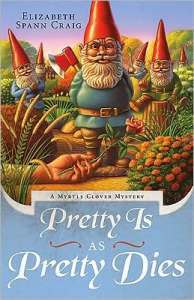With Self-Publishing, We Control the Future of a Series
By Elizabeth S. Craig, @elizabethscraig
For years, I belonged to several email loops with other traditionally published mystery writers. We would share information and resources with each other and were on a blogging schedule to contribute to the group blog.
Eventually, I dropped out of all of these groups. One of my failings is my lack of patience and another is my overwhelming desire to fix things. These two issues combined with a dose of me-trying-to-be-professional meant that I was constantly biting my tongue while reading messages from these loops regarding author issues with our traditional publishers.
I was especially sad on the occasions when an author would apologize for having their series canceled. They would be in the process of pitching another series to their agent and/or publisher and would offer to drop out of the blog since they weren’t sure if they were going to continue being contracted writers.
I knew that any advice I gave, at least at the time, about them getting their rights to their characters back and continuing their series through self-publishing probably wouldn’t be well-received. But it really shook me to hear them. It was as if they would accept defeat….not be a writer anymore. Because of some whim of the market or the publisher. Or maybe simply because their editor moved on to another publisher, “orphaning” the series. They’d accept this as the inevitable end of their series and sometimes their career. A bad sales record follows writers and other publishers might not want to gamble on them.
Maybe these authors still even had readers for the series. They’d mention that they still got emails or Facebook messages from readers asking about their next book in the series. They’d mention having to carefully word the truth—that the publisher didn’t want any more books.
As you can imagine, this all would frustrate the stew out of me. But I knew these authors were aware of self-publishing. There was an anti-self-pub bias in the loops, actually. I didn’t think they’d find my advice to take their series indie very helpful. I’d complain about this to my husband, who eventually pleaded with me to drop out of the loops—that they appeared to be making my blood pressure rise. :)
And so I did. Frankly, even if my advice to self-publish was well-received, did I really want the competition?
My own experience was similar to those writers who had their series dropped. My first traditionally published Myrtle Clover book was Pretty is as Pretty Dies with Midnight Ink, a division of Llewellyn. After the first book published, it seemed to me to be selling well. I wrote another book for the series and was politely rejected.
In my head, though, it wasn’t over. I had the book. I knew I had readers.
My agent offered to shop the series to another publisher. I decided that was probably going to take too long—that I would have to start over again with a new reader base.
One big eye-opening moment for me was when I was on a book tour and at a panel event with other mystery writers…promoting my new series for Penguin. They opened the floor up for questions and my first question, right out of the gate, was from a reader asking when my next Myrtle Clover was going to come out.
Later on that same tour, I got the same question from another reader at a signing.
It was obvious to me then that I couldn’t just accept that the series was over. That hadn’t been my gut reaction anyway. I had the ability to continue writing as many books as I wanted in that series. What was more, I felt I had something of a responsibility to my readers to do so.
The future of my series depended on my readers and me. It had nothing to do with what was hot, who wanted to contract books with elderly protagonists, or the rapidly changing editors at my publisher. And that knowledge was empowering.
This is one reason why I feel strongly that this is the best time in history to be a writer.
The post With Self-Publishing, We Control the Future of a Series appeared first on Elizabeth Spann Craig.



